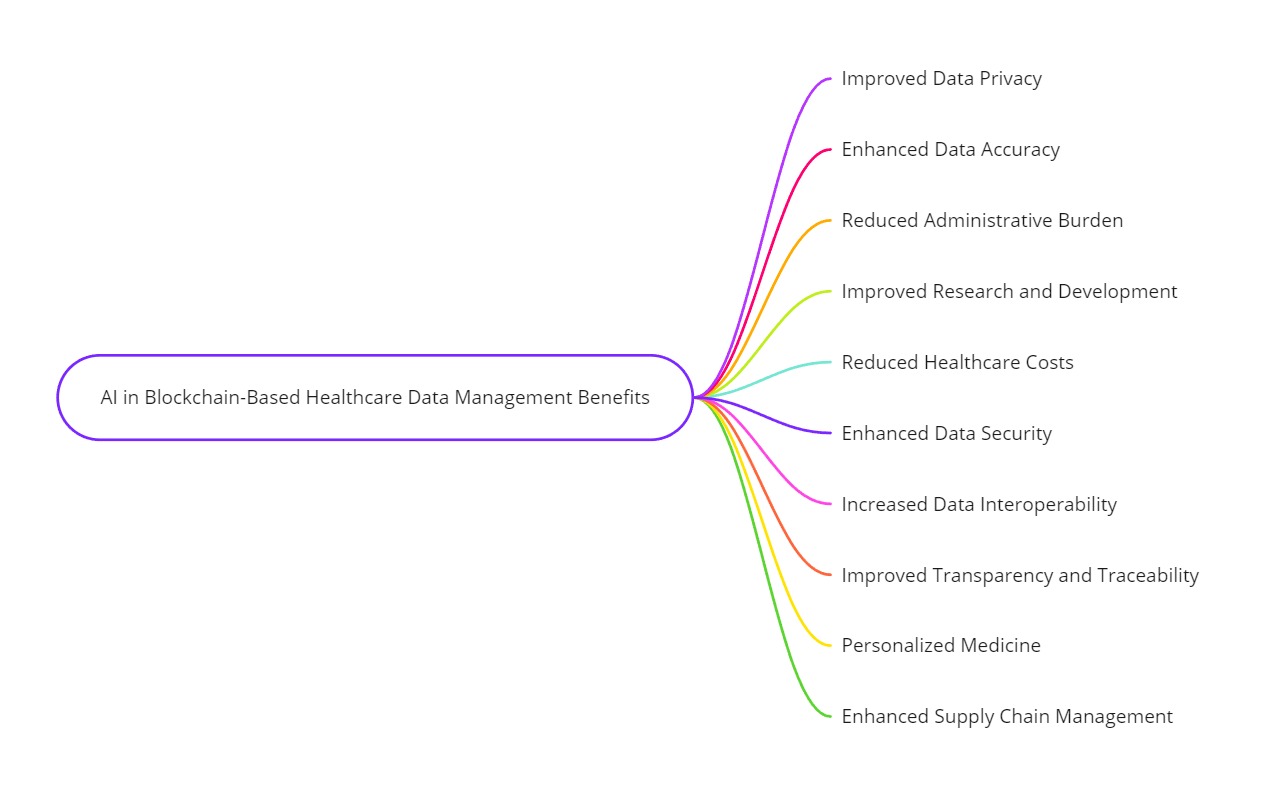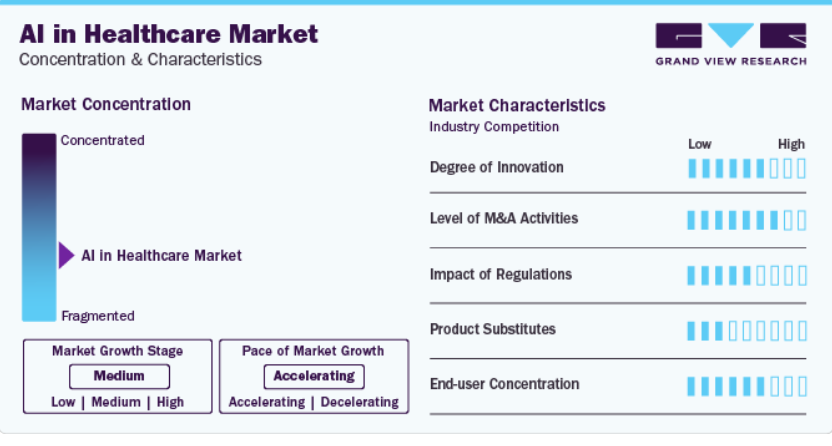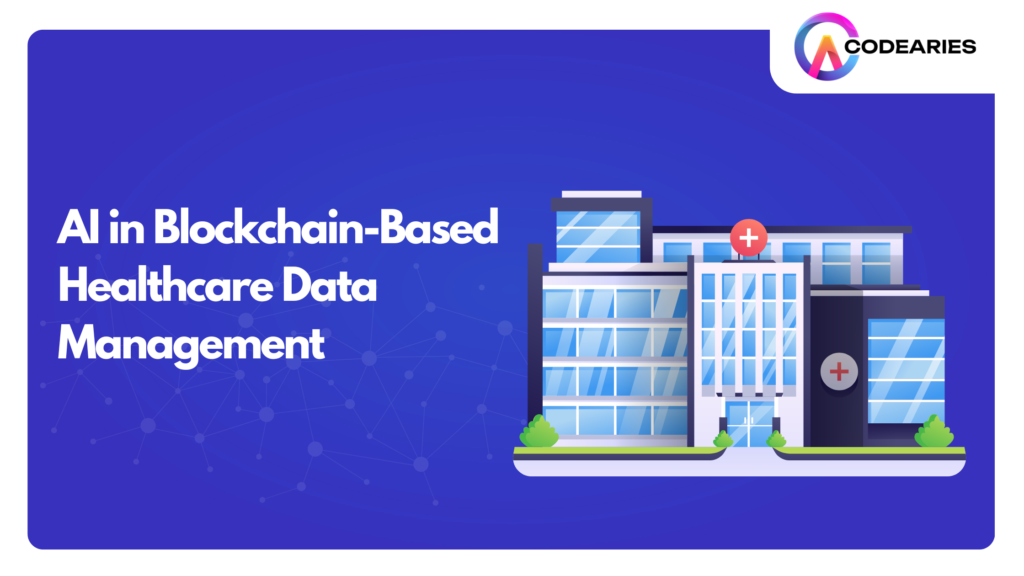Did you know? The global artificial intelligence in the healthcare market was valued at USD 16.3 billion in 2022 and is expected to grow at a CAGR of 40.2% to reach USD 173.55 billion by 2029. In recent years, the fusion of Artificial Intelligence (AI) and blockchain technology has presented innovative solutions for managing healthcare data. As data grows exponentially, healthcare providers face unprecedented challenges in ensuring security, privacy, and accuracy in data handling. By combining AI’s computational prowess with blockchain’s secure, decentralized ledger, healthcare institutions can revolutionize how they manage and share sensitive medical information.
AI in blockchain-based healthcare data management allows handling vast data sets, ensuring real-time access, transparency, and integrity. As both technologies evolve, their application in healthcare promises to improve patient outcomes, streamline administrative processes, create secure records, and prevent fraudulent activity. It’s an exciting intersection where two of the most transformative digital innovations converge for the benefit of public health.
Transforming Healthcare Data Management with AI and Blockchain
The integration of artificial intelligence (AI) and blockchain technology holds immense promise for the future of healthcare data management. These technologies can create a more useful and trustworthy healthcare ecosystem by tackling critical issues like data security, privacy, interoperability, and accuracy.
Key Advantages
- Robust Data Security: Blockchain’s immutability and cryptographic protocols protect patient data from unauthorized access.
- Enhanced Data Privacy: Decentralization reduces data breach risks, giving patients more control over their personal information.
- Streamlined Interoperability: Facilitates seamless data sharing among providers, improving patient care.
- Improved Data Accuracy: Smart contracts automate data validation, minimizing human errors in records.
- Transparency and Traceability: Provides an auditable record of transactions, fostering trust between patients and providers.
- Reduced Administrative Overhead: AI automates data management, lowering costs and allowing healthcare professionals to focus on care.
- Accelerated Research and Development: Enables secure, collaborative research by allowing safe sharing of patient data while maintaining confidentiality.
- Cost Reduction in Healthcare: Increased efficiency and reduced administrative burdens lead to significant savings for systems and patients.

Practical Applications of AI in Blockchain-Enhanced Healthcare Data Management
The fusion of AI and blockchain technology presents transformative opportunities for healthcare data management. Here are some innovative applications that illustrate this potential:
Patient Records
- Secure Storage: Utilizing blockchain for patient medical records ensures data is stored securely, with strong protections against unauthorized access.
- Data Interoperability: Blockchain facilitates seamless data exchange among healthcare providers, effectively breaking down information silos and improving care coordination.
- Personalized Treatment: AI algorithms can analyze comprehensive patient data to generate tailored treatment recommendations, enhancing the effectiveness of care.
Clinical Trials
- Data Integrity: Blockchain technology can track data collection and verification processes in clinical trials, ensuring accuracy and maintaining the integrity of research findings.
- Research Collaboration: Secure sharing of patient data via blockchain allows researchers to collaborate more effectively while safeguarding privacy.
- Efficient Data Management: Automating data collection and analysis streamlines clinical trial management, allowing for faster and more accurate results.
Supply Chain Management
- Tracking Medical Supplies: Blockchain can monitor the entire supply chain of medical products and pharmaceuticals, reducing the risk of counterfeiting and ensuring quality assurance.
- Operational Efficiency: Supply chain processes can be optimized by minimizing manual interventions, leading to enhanced visibility and quicker response times.
- Cost Reduction: Improved efficiency within the supply chain can significantly lower operational costs by reducing waste and resource misuse.
Insurance Claims
- Fraud Detection: AI can scrutinize claim data for anomalies, helping to look for and prevent fraudulent activities in real time.
- Streamlined Processing: Automating data verification processes allows for faster claims handling, reducing the administrative burden on healthcare providers.
- Enhanced Accuracy: AI-driven analytics can uncover errors and inconsistencies in claims, leading to more precise processing and fewer disputes.
Research Collaboration
- Secure Data Sharing: Blockchain enables safe and efficient data sharing among researchers, fostering collaborative studies while protecting sensitive information.
- Patient Privacy: By maintaining stringent privacy measures, researchers can access necessary data without compromising patient confidentiality.
- Accelerated Research: Providing access to large-scale datasets facilitates quicker insights and innovations in medical research.
Healthcare Cost Reduction
- Lower Administrative Costs: Automating routine administrative tasks minimizes paperwork and reduces staffing needs.
- Improved Workflow Efficiency: Streamlining processes can reduce waste and more effectively use resources across healthcare organizations.
- Fraud Prevention: By leveraging AI to detect fraudulent activities, healthcare systems can mitigate financial losses and improve overall fiscal health.
Personalized Medicine
- Comprehensive Data Analysis: AI can use extensive patient datasets to identify health patterns and trends that inform treatment approaches.
- Tailored Treatment Plans: AI can recommend customized treatment strategies that align with patients’ specific health needs by analysing individual characteristics.
- Better Patient Outcomes: Personalization in treatment increases the likelihood of positive outcomes, enhancing overall patient satisfaction and health.
Enhancing Data Security Through Blockchain and AI

Blockchain is often hailed for its inherent security features, offering encrypted, immutable records that are difficult to alter or tamper with. Security measures can be further enhanced when AI is integrated into this framework. AI-driven algorithms can automate the detection of potential threats and anomalies within the blockchain, alerting healthcare providers to possible breaches before they occur.One of the significant challenges in healthcare data management is the risk of unauthorized access. Blockchain’s decentralized nature makes sure that no single entity controls the entire data flow, mitigating this risk. AI’s machine learning capabilities also enable real-time monitoring and automatic responses to suspicious activity, fortifying the integrity of patient records.
Improving Interoperability Between Healthcare Systems
Healthcare systems are notorious for their siloed data environments, where critical information is stored in disparate locations. This fragmented structure often leads to provider communication gaps, negatively affecting patient care. Using blockchain technology, data can be stored in a decentralized network accessible to authorized healthcare professionals globally.AI further enhances this capability by ensuring the seamless flow of data across different systems. Machine learning algorithms can predict potential interoperability issues and solve them proactively. For instance, AI can standardize formats and ensure that healthcare providers have access to the most updated and accurate information, regardless of the system they are using.
How AI Enhances Blockchain’s Security Protocols
Blockchain alone provides excellent data protection by ensuring immutability and decentralized control. However, these security protocols can be fortified even further when AI is integrated. AI-driven tools can autonomously monitor blockchain networks, identifying and flagging suspicious activities.Additionally, AI can streamline the encryption processes within blockchain systems, reducing human error and creating stronger, more resilient security layers. By automating security checks and using predictive analytics, healthcare institutions can detect potential security vulnerabilities long before they lead to data breaches.
The Role of Smart Contracts in Healthcare
Smart contracts are self-executing contracts stored on a blockchain, where the terms of the agreement are directly written into code. They play a pivotal role in healthcare by automating various processes, such as billing, insurance claims, and medication dispensation. This automation ensures that processes occur without the need for third-party verification, making transactions faster and more efficient.
Key Roles of Smart Contracts in Healthcare
Data Management and Sharing
-
- Secure data storage: Smart contracts can securely store patient data on a blockchain, ensuring privacy and preventing unauthorized access.
- Automated data sharing: Smart contracts can automate the sharing of patient data between healthcare providers, streamlining processes and reducing errors.
Supply Chain Management
-
- Track medical supplies: Smart contracts can track the movement of medical supplies, ensuring authenticity and preventing counterfeiting.
- Improve efficiency: Smart contracts can automate supply chain processes, reducing costs and improving efficiency.
Clinical Trials
-
- Manage patient enrollment: Smart contracts can automate patient enrollment in clinical trials, ensuring compliance with regulations.
- Track data collection: Smart contracts can track data collection and verification, ensuring data integrity and accuracy.
Insurance Claims
-
- Automate claims processing: Smart contracts can automate the processing of insurance claims, reducing manual work and speeding up payments.
- Prevent fraud: Smart contracts can help prevent insurance fraud by verifying data and detecting anomalies.
Payment Processing
-
- Secure payments: Smart contracts can facilitate safe and transparent payments between healthcare providers and patients.
- Reduce fraud: Smart contracts can help prevent payment fraud by verifying transactions and detecting anomalies.
AI-Powered Analytics in Healthcare Blockchain Systems
AI algorithms can sift through huge amounts of health data stored on the blockchain, identifying trends and anomalies that may not be immediately visible to healthcare providers.
Key Roles of AI-Powered Analytics
Data Analysis and Insights
-
- Predictive analytics: This technique analyzes historical data to predict future trends and outcomes, such as disease outbreaks or patient risk factors.
- Anomaly detection: Identify unusual patterns or deviations in data that may indicate fraud, errors, or other issues.
- Patient risk stratification: Identify high-risk patients for specific diseases or complications.
Clinical Decision Support
-
- Personalized treatment plans: Develop personalized treatment plans based on individual patient data and AI-generated insights.
- Drug discovery: Accelerate drug discovery by analyzing large-scale datasets to identify potential drug targets.
Research and Development
-
- Accelerate research: Facilitate collaborative research by analyzing large-scale datasets and identifying new research opportunities.
- Improve outcomes: Improve research outcomes using AI to analyze data and identify meaningful insights.
The Future of AI-driven Blockchain in Healthcare
The intersection of AI and blockchain in healthcare is rapidly evolving, with key trends shaping its future. Federated learning allows for decentralized data training, enhancing privacy while enabling collaborative research. AI-driven interoperability solutions facilitate seamless data exchange, while blockchain-based marketplaces promote the tokenization of healthcare assets, incentivizing innovation. AI is also revolutionizing drug discovery, personalizing treatments, optimizing supply chain logistics, and enhancing patient engagement through secure remote monitoring. Furthermore, ethical governance ensures transparency and mitigates bias, and integrating quantum computing promises improved security and faster AI computations. These advancements are set to significantly enhance data security, interoperability, and personalized care in healthcare.
Conclusion
The convergence of AI and blockchain technology in healthcare represents a transformative shift in data management, promising enhanced security, privacy, and interoperability. By leveraging blockchain’s decentralized and immutable nature alongside AI’s analytical capabilities, healthcare institutions can optimize patient care, streamline administrative processes, and mitigate fraud. This innovative fusion paves the way for personalized treatment and accelerated research and ensures that patient data is handled with the utmost integrity. As these technologies continue to evolve, their integration will undoubtedly lead to a more efficient, secure, and patient-centered healthcare ecosystem, ultimately improving health outcomes for all.
FAQs
Which algorithm is used in blockchain healthcare?
In blockchain healthcare, various consensus algorithms are utilized, with Practical Byzantine Fault Tolerance (PBFT) and Delegated Proof of Stake (DPoS) being popular choices due to their efficiency and scalability. These algorithms help ensure data integrity and secure transactions, crucial in managing sensitive healthcare information while minimizing energy consumption and improving transaction speeds.
What are examples of AI medical devices?
Examples of AI medical devices include smart wearables like the Apple Watch, which monitors vital signs and activity levels, and AI imaging systems such as those developed by Zebra Medical Vision, which analyzes medical images for disease detection. Additionally, robotic surgery systems like the da Vinci Surgical System use AI for surgery precision. At the same time, platforms like Tempus employ AI to assist in cancer treatment decisions by analyzing clinical data.
Which is the best AI in the healthcare sector?
Identifying the “best” AI in healthcare is subjective, but leading platforms include IBM Watson Health, known for its data analytics capabilities, and Google DeepMind, recognized for advancements in medical imaging. Another notable example is Aidoc, which focuses on real-time analysis of medical images to detect abnormalities. These platforms excel in various applications, enhancing diagnostics, treatment planning, and operational efficiencies.
What is the use of AI in hospital management systems?
AI significantly enhances hospital management systems by optimizing resource allocation and predicting patient admissions through data analysis. It improves patient engagement via AI-powered chatbots for scheduling and inquiries while streamlining billing and claims processing to reduce errors. Additionally, AI identifies workflow bottlenecks, increasing operational efficiency and improving patient care delivery.







